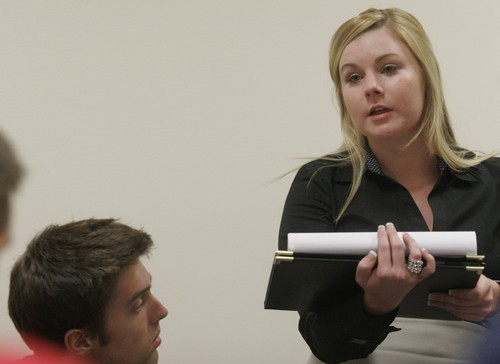The Associated Students of the University of Arizona Senate debated for nearly an hour last night over proposed changes to its elections code, mostly over a $25 down-payment for future candidates.
The elected student leaders had just finished a tour of the new Student Recreation Center expansion and gathered around a conference table in a room on the second floor instead of their usual spot in the Student Union Memorial Center.
About 30 people sat in chairs next to illustrations of the Rec Center construction and tables donned with novelty hard hats as Justine Piscitello, ASUA elections commissioner, read through the proposed changes to the elections code.
Most changes were in response to last year’s ASUA elections and where potential future problems may occur.
As a write-in candidate, ASUA President Chris Nagata defeated Pima College transfer student Shane Cathers last year.
Nagata did not meet deadlines to be considered a regular candidate, but had 500 signatures of support.
“”We thought (the former requirement) was completely unfair,”” said Piscitello, an senior majoring in Italian.
If the Senate accepts Piscitello’s changes, future write-in candidates will also need to receive 500 votes during the ASUA primary elections in order to continue.
“”We wanted to make people realize that being a candidate is important, getting the necessary requirements in is important,”” she said. “”But if they aren’t able, they still have a chance as a write-in candidate.””
Another proposed change will specifically forbid a write-in candidate’s name from appearing on the ballot.
An information blurb appeared on last year’s ballot which included Chris Nagata’s name.
The blurb was removed from the online ballot midway through the polls by then-elections commissioner Kenny Ho.
There were no objections to either write-in regulation change, although Piscitello did encounter opposition from Sen. Daniel Wallace over increasing the election commissioner’s power to determine official polling locations and prohibiting candidates from using personal computers to “”garner votes”” on election day.
Wallace said it could be an impractical and unnecessary burden to have to regulate how candidates use their own property throughout the election.
“”Anything that’s in violation of the code, unless we see it or unless we hear about it, there’s really no way for us to do anything about it,”” Piscitello said. “”This code is really an umbrella.””
Piscitello also said that she was aware that concerns had been brought up during last year’s election that some candidates had stood outside sorority and fraternity houses collecting votes from friends.
Piscitello did not know any specifics.
Attitudes flared as the conversation turned toward a proposed $25 dollar campaign material removal down-payment fee designed to encourage candidates to follow proper campaign material guidelines on voting day.
The ASUA elections code governs, among many things, where candidates can put up posters, and regulates the content of both print and online materials.
“”Any fee discourages people from running, regardless of the amount,”” said Wallace, who raised repeated objections.
“”I’m not aware that there’s ever been a particular problem with people egregiously disregarding the code,”” he said after the meeting.
Former 2006 election commissioner David Martinez III is now UA alum and director of the Arizona Students Association. He was asked by Sen. Eduardo Atjian II for his opinion on the $25 fee.
“”You have to trust the code that is drafted to this year and what she has brought to the table,”” Martinez said and followed with a nervous laugh.
“”This is in place so that even if you lose the election, you are still responsible for taking down your (campaign material) so that you get your $25 back,”” Sen. Katherine Weingartner said.
“”Instead of paying a $25 fee, you could use that money to fuel your whole campaign cost,”” said Sen. James Brooks, who said his campaign cost $75, only because he overestimated how many posters he’d use.
“”I don’t see why it’s that big of an issue,”” said Sen. Tyler Quillin. “”If you don’t break the rules, you won’t pay $25. If you plan on running and breaking the rules, plan on losing your $25.””
“”We wanted to make it like any other deposit … like one you put on your house. You get it back unless you mess up your house,”” Piscitello said.
ASUA candidates are limited to spending $200 on their campaigns.
“”This is normal for the elections code,”” ASUA Executive Vice President Emily Fritze told the senators as she concluded the discussion.
“”It’s good that you guys get practice at establishing a fair elections code.””
ASUA has two more meetings before they are required to finalize an election code.
Fritze jokingly warned that she intends to bring her gavel to the next one just in case things get out of hand.









